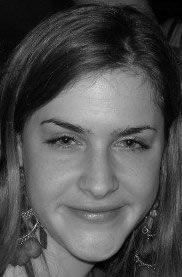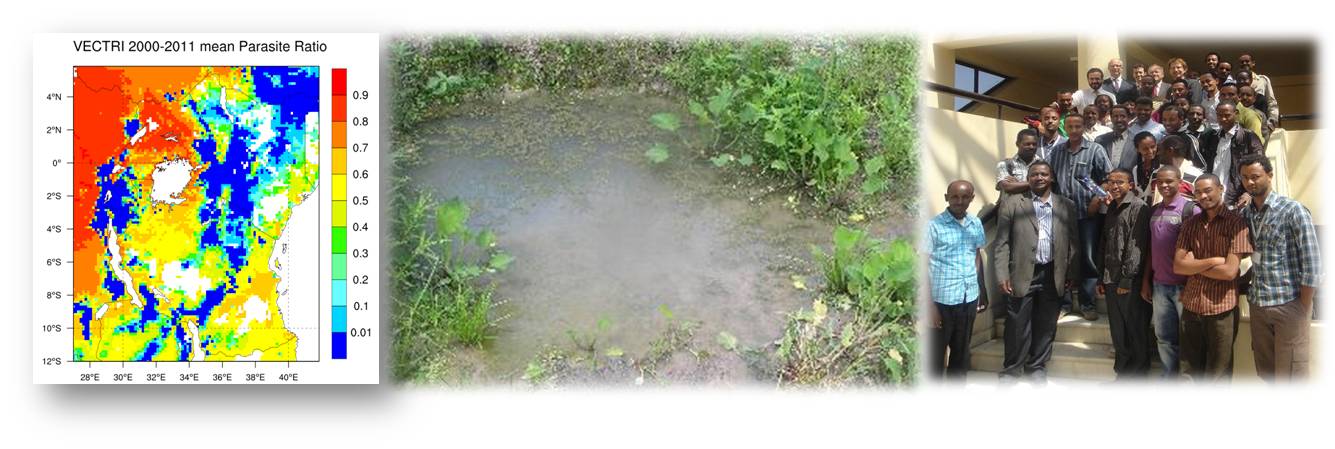The Author
 Adrian Tompkins is the author of VECTRI.
He has a background in climate modelling in
particular in the physics of tropical clouds
and convection.
At ECMWF he was a staff scientist responsible
for the development of the cloud physics in
the operational forecasting system. While
there he became interested in how forecasts,
both short range and monthly to seasonal,
could be better used on the ground in Africa. Once at ICTP, his interest
grew in malaria modelling as a result of being
involved in the design of two EUFP projects,
one of which he co-authored, on climate and
health. In 2010, it was apparent that there
was a need for a regional
malaria model that could be applied to
forecasting tasks, but that accounted for
population dynamics, in particular to account
for different tranmission rates in urban and
rural environments. Applying the techniques
acquired
in the numerical and technical development of
cloud and convection parameterization schemes,
the code develoment started in 2011. In
November of that year VECTRI was launched in Addis Ababa
and is still undergoing active development
with an expanding team of collaborators.
Adrian Tompkins is the author of VECTRI.
He has a background in climate modelling in
particular in the physics of tropical clouds
and convection.
At ECMWF he was a staff scientist responsible
for the development of the cloud physics in
the operational forecasting system. While
there he became interested in how forecasts,
both short range and monthly to seasonal,
could be better used on the ground in Africa. Once at ICTP, his interest
grew in malaria modelling as a result of being
involved in the design of two EUFP projects,
one of which he co-authored, on climate and
health. In 2010, it was apparent that there
was a need for a regional
malaria model that could be applied to
forecasting tasks, but that accounted for
population dynamics, in particular to account
for different tranmission rates in urban and
rural environments. Applying the techniques
acquired
in the numerical and technical development of
cloud and convection parameterization schemes,
the code develoment started in 2011. In
November of that year VECTRI was launched in Addis Ababa
and is still undergoing active development
with an expanding team of collaborators.
ICTP Team
 Felipe Colon Gonzalez obtained his PhD at UEA working on statistical models for dengue tranmission - he is presently working on large and complicated datasets for malaria transmission in Rwanda and Uganda, for which he aims to apply statistical modelling techniques to identify in particular the role of socio economic factors in transmission. He is using the data to validate VECTRI runs and aims eventually to develop a hybrid statistical-dynamical system built around VECTRI that incorporates socio economic factors that are difficult to model explicitly.
Felipe Colon Gonzalez obtained his PhD at UEA working on statistical models for dengue tranmission - he is presently working on large and complicated datasets for malaria transmission in Rwanda and Uganda, for which he aims to apply statistical modelling techniques to identify in particular the role of socio economic factors in transmission. He is using the data to validate VECTRI runs and aims eventually to develop a hybrid statistical-dynamical system built around VECTRI that incorporates socio economic factors that are difficult to model explicitly.
Ernest Asare (KNUST,
Ghana) - is from Ghana and is conducting his
PhD at KNUST and at ICTP under
the STEP
sandwich programme, co-supervised by Adria
Tompkins. The key aim of his research is to improve the surface hydrology aspect of VECTRI.
Collaborators
 Volker Ermert (Cologne, Germany) is an expert on the Liverpool Malaria Model (LMM) which he used for his PhD work. Volker visited ICTP for a month in 2011 to advise on the parametrization choices to be implementated in VECTRI for the temperature sensitivities. His extensive knowledge of the malaria literature hugely accelerated the model development process, and Volker is the co-author on the first VECTRI manuscript.
Volker Ermert (Cologne, Germany) is an expert on the Liverpool Malaria Model (LMM) which he used for his PhD work. Volker visited ICTP for a month in 2011 to advise on the parametrization choices to be implementated in VECTRI for the temperature sensitivities. His extensive knowledge of the malaria literature hugely accelerated the model development process, and Volker is the co-author on the first VECTRI manuscript.
 Francesca
di Giuseppe (ECMWF, UK) has a background in modelling
radiation interaction within clouds, and has coauthored a
number of papers with Adrian Tompkins on this subject. She is
now working at ECMWF on the QWeCI project where a new EOF-based
spatial bias correction was designed to allow the monthly and
seasonal forecast systems to be joined seamlessly. She is now
working with ICTP to set up a pilot malaria forecasting system that uses these
forecasts to drive VECTRI, which will be tested over Malawi,
Uganda and Rwanda with ministry of health partners from the
QWeCI and HEALTHY FUTURES projects.
Francesca
di Giuseppe (ECMWF, UK) has a background in modelling
radiation interaction within clouds, and has coauthored a
number of papers with Adrian Tompkins on this subject. She is
now working at ECMWF on the QWeCI project where a new EOF-based
spatial bias correction was designed to allow the monthly and
seasonal forecast systems to be joined seamlessly. She is now
working with ICTP to set up a pilot malaria forecasting system that uses these
forecasts to drive VECTRI, which will be tested over Malawi,
Uganda and Rwanda with ministry of health partners from the
QWeCI and HEALTHY FUTURES projects.
 Rachel Lowe (IC3) Rachel Lowe (IC3) was a Visiting Scientist at ICTP for a period of 16
months before moving to IC3 to return to her work on dengue transmission
in the Americas within the project DENFREE. She continues to collaborate
with ICTP with the analysis of malaria transmission data in Malawi within
QWeCI and will be leading the evaluation of the VECTRI-based forecasting
system over the region.
Rachel Lowe (IC3) Rachel Lowe (IC3) was a Visiting Scientist at ICTP for a period of 16
months before moving to IC3 to return to her work on dengue transmission
in the Americas within the project DENFREE. She continues to collaborate
with ICTP with the analysis of malaria transmission data in Malawi within
QWeCI and will be leading the evaluation of the VECTRI-based forecasting
system over the region.
